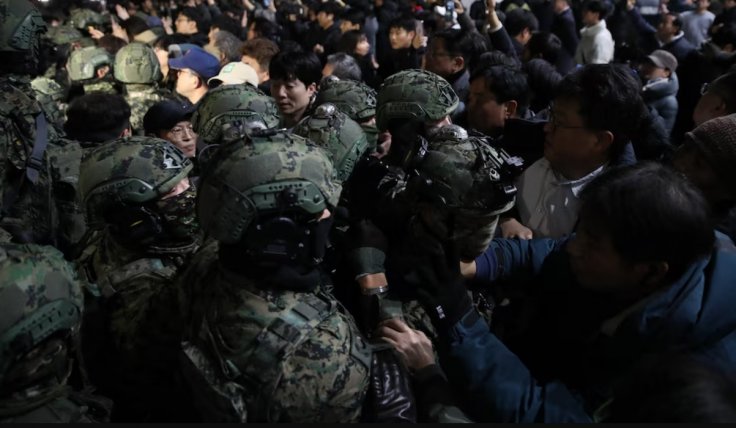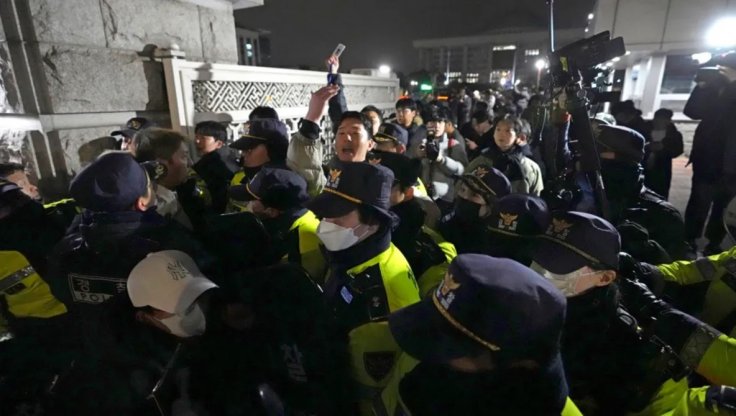Unrest in South Korea as President Yoon Suk Yeol Declares Emergency Martial Law Citing Anti-State Element, Communist Threats

South Korea’s President Yoon Suk Yeol made a sensational announcement on Tuesday night, declaring emergency martial law and accusing his political opposition of subverting parliament. He also condemned what he described as “pro-North Korea, anti-state forces” operating in the country.
The sudden and shocking announcement sparked widespread unrest in Seoul, where crowds of enraged citizens clashed with riot police and security forces near the National Assembly. The South Korean military also announced that under the martial law, political gatherings, including those in parliament, would be suspended if they posed a risk of “social unrest” in the country. Also, those found violating the imposed regulations could face arrest without a warrant.
Unrest in South Korea
X
Announcing the imposition of martial law, Yoon vowed “to protect the free Republic of Korea from the threat of North Korean communist forces, to eradicate the despicable pro-North Korean anti-state forces plundering the happiness of our people and to protect the constitutional order.”
“With no regard for the livelihoods of the people, the opposition party has paralyzed governance solely for the sake of impeachments, special investigations, and shielding their leader from justice… Through this martial law, I will rebuild and protect the free Republic of Korea, which is falling into the depths of national ruin,” Yoon said.
However, his speech immediately ignited widespread outrage, with frustrated citizens marching toward the capital’s parliament building in protest.

X
Since assuming office in 2022, Yoon has faced challenges advancing his policies due to an opposition-dominated parliament, leading to speculation that the abrupt enforcement of martial law might be a political strategy to consolidate power.
Yoon’s popularity has also waned recently, fueled by scandals involving members of his inner circle. The opposition has pushed for the impeachment of cabinet officials over their failure to investigate allegations of corruption and influence-peddling against Yoon’s wife.
The decision has stunned South Korea, a Western-aligned nation of over 50 million people. Despite rising tensions with its northern adversary, the country is not engaged in active conflict and has not faced attacks on its territory.
Seoul Erupts
Dramatic images emerged showing riot police and armed officers clashing with furious protesters outside the National Assembly shortly after Yoon’s speech was broadcast. News footage also captured helicopters descending in the evening sky, landing atop the parliament building as troops disembarked and secured the area.

X
Other photos showed heavily armed soldiers in tactical gear patrolling the hallways of the National Assembly, where parliamentary staff were seen attempting to repel them by spraying fire extinguishers.
Yoon’s declaration faced swift backlash, including criticism from within his own conservative People Power Party. Party leader Han Dong-hoon condemned the move as “wrong” and pledged to “oppose it alongside the people.”

X
Opposition leader Lee Jae-myung, who narrowly lost the 2022 presidential election to Yoon, labeled the proclamation “illegal and unconstitutional.”
According to South Korea’s Constitution, martial law can only be declared to address military threats or maintain public order and safety through military intervention. However, the duration of Yoon’s martial law remains uncertain.
When a president declares martial law, they are required to notify the National Assembly, which can then vote on whether to uphold the decision. If a majority in the Assembly, currently controlled by the opposition, votes to lift martial law, the president is obligated to comply.








